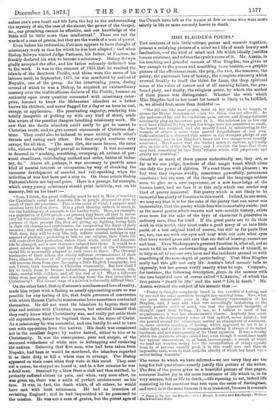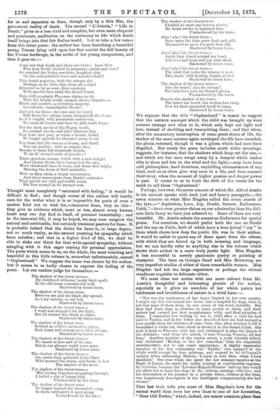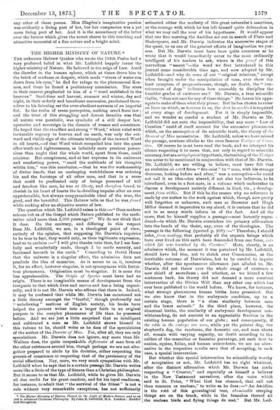MISS BLA.GDEN'S POEMS.*
THE contents of this little volume, poems and memoir together, present a satisfying picture of a mind and life of much beauty and fascination,—of the kind of mind and life which ideally justifies- human existence, and refutes the cynic's scorn of it. Mr. Austin, in his touching and graceful memoir of Miss Blagden, has given us key enough to the poems and something more besides,—a graphic picture of the affectionateness, the pity, the tact, the resource, the gaiety, the passionate love of beauty, the complete sincerity which avowed frankly to itself the thirst for fame, the deep spiritual sense of the value of sorrow and of all seeming failure, the pro- found piety, and finally, the religious peace, by which the author of these poems was distinguished. Whether the wish which Miss Blagden had in her heart for herself is likely to be fulfilled, is, we should fear, more than doubtful :— "She did not, like some people, insist on her right to be happy, or accuse the Divine Government when the claim was not allowed. As she understood life and its conditions, pain, sorrow, and disappointment necessarily play an important part in it. She relished joy as few can ever have relished it ; but when the wings wore not permitted to exult, the breast was resigned, and she usually found in ministering to the wounds of others a more than partial forgetfulness of her own. Chateaubriand has observed that sorrow is the strongest pledge of our immortality; and in Isa Blagden's heart the two things were steadily associated. But I know that sho wished much to survive, spiritually also, on this side of the dark line ;and I cherish the hope that there may lurk something in this little volume which will perpetuate and gratify her yearning."
Graceful as many of these poems undoubtedly are, they are, as far as we can judge, destitute of that magic touch which alone can defy the power of oblivion. We read them with pleasure ; we feel that they express vividly, sometimes powerfully, permanent emotions ; but the turn of the thought and the language seldom seem to give us a new experience, or a new knowledge of the human heart, and we fear it is this only which can render any kind of poetry immortal. But poetry which is not likely to be immortal has plenty of function in this world. Indeed, in one sense, we may say that it is for the sake of the poetry that can never win immortality, that the poetry which does win immortality exists; just as the moral genius which recasts and new-moulds history, exists even more for the sake of the type of character it generates in ordinary men, than for itself. If the great poets are to do their work in this world, they must make a good many of us into little poets, of a less original kind of course, but still so far poets that we, too, can see with our eyes and hear with our ears what eyes that have waxed gross and ears that are dull of hearing, cannot arse and hear. Even Shakespeare's greatest function is, after all, not so much to fill us with understanding and admiration of himself, as to help us all to see our own lives and the incidents around us with something of the same depth of poetic feeling. That Miss Blagden really had this gift not only Mr. Austin's brief memoir tells us expressly, but her poems verify exactly what he says. Compare, for instance, the following description, given in the memoir with the two beautiful sets of verses called " L'Ariccia," of which the first paints " Death in life" and the next "Life in death." Mr. Austin writes of the subject of his memoir thus :— "Poetry is thought completely fused in the crucible of fooling, and by one and the same operation wrought into metrical form. Now, what was most remarkable even in the ordinary conversation of Ise. Blagden, and, I may add, what was exceedingly tantalising to the merely positive order of mind, was that she appeared incapable of thought apart from feeling. To me, as I believe to most of hor acquaintances, it was her characteristic charm. Anybody less senti- mental, in the depreciatory sense of that epithet, never existed ; but she poured around the commonest matter an atmosphere of sentiment, or, more strictly speaking, of feeling, which appeared to sot it in a fuller light, and to give it completeness, robbing it always of its naked hardness, and not unfrequontly of its blunt injustice. It was a faculty which the judicious always envied her, even though it sometimes made her appear inconsistent, or, at least, inconsequent; a result at which we need not wonder, seeing how the reconciliation of things equally true, as of persons equally good, is in this world now and then an impossible task, even to that catholic charity of which her heart was a never-failing fountain."
The verses to which we have referred—we are sorry they are too long for full quotation—exactly justify this picture of the writer. The first of the poems gives us a beautiful picture of that pagan, sensuous Italian joy in the mere luxuriance of life which is, in its very essence, felt as life in deatb,—life ripening to rot, indeed life consisting in the emotions that rest upon the sense of fleetingness, and revel in it the more because it is so transient, because it conceals " Poems by the late Isa Blagden ; with a Memoir. London and Edinburgh : William Blackwood and Sons.
for us and separates us from, though only by a thin film, the permanent reality of death. The second " L'Ariccia," "Life in Death," gives us a less vivid and complete, but even more eloquent and passionate, meditation on the testimony to life which death itself brings into that fair Italian world. Let us take a few verses from this latter poem ; the author has been describing a beautiful young Tuscan lying cold upon her bier amidst the fall beauty of the Tuscan landscape, in the midst of her young companions, and then it goes on :—
Some say that death and sleep are twins : have they
E'er seen Death clothed in garments quaint and rare ?
Or watched the living sunshine, laughing play On the cold polished brow and waveless hair?
This dumb negation, with the solemn sky Shining on its white lips, from all around Divorced as far as some lone mystery, With marble face amid the desert found.
This chill prophetic Presence claims no tie
With the bright world, around, above, beneath,—
Blank and austere, a crownless majesty, Inscrutable—immitigable Death !
And yet she lives : for ever and for °veil
Still floats the solemn hymn throughout the dome As if it sought, with passionate endeavour, To reach all hearts and bear its glad truth home.
Not the dark moral of the Pagan world, Its painted cheeks and false illusions fair, Now here, now past, as when a banner furled No longer spreads its blazoned pomp to air.
For them this life was as a dream, and death The one reality; with us nought dies. Beauty to them but transitory breath, To us th' eternal smile of paradise !
These gracious scenes, which with a rare delight And charm divine have banqueted the eye, Wore chastened hues to them, and shone less bright, Sharing the doom of frail mortality.
With us they claim a bright inheritance,
And shine emancipate from Death's control—
They perish not with perishable sense, But live eternal in th' eternal soul.
Thought more completely "saturated with feeling," it would be difficult to find ; and though verses of this calibre will hardly earn for the writer what it is so impossible for poets of even a modest kind not to wish for,—immortal fame, they do this— they give us evidence which, more or less, almost every human heart may one day find in itself, of personal immortality ; and in the immortal life, it may be hoped, we may soon outgrow the natural and serviceable, but certainly transient passion for fame. It is probable indeed that the desire for fame is, in large degree, not so much vanity, as the earnest yearning for sympathy which fame satisfies ; and that in a higher kind of life, we shall be able to slake our thirst for that wide-spread sympathy, without mingling with it this eager craving for personal appreciation. The poem which seems to us, on the whole, the moat touching and beautiful in this little volume is, somewhat unfortunately, named "Orphanhood." We suppose the name was chosen by the author, but it seems to us badly chosen to express the feeling of the poem. Let our readers judge for themselves :—
The shadow of the forest trees—
My childhood withered 'noath their spell, In the old home remembered well, Shadowed by forest trees. The shadow of the forest trees Between me and the black sky spread, As I lay waking on my bed.
Shadowed by forest trees.
The shadow of the forest trees—
I wept and struggled for the light, But all around was black as night, Shadowed by forest trees.
The shadow of the forest trees Robbed us of life's enchanting plays; Both heart and stream were dark always, Shadowed by forest trees.
The shadow of the forest trees— We heard of love and of the sun, But in our gloomy world were none,
Shadowed by forest trees.
The shadow of the forest trees—
One morn they quivered in the blast. Wild moaned the storm, and broke at last The shadow of the trees.
The shadow of the forest trees—
'Mid tossing branches struggling through, I hailed a sky of happy blue Unshadowed by the trees. The shadow of the forest trees No longer hushed the streamlet's song, In fierce wild mirth it sped along. Unshadowed by the tress. The shadow of the forest trees Clouded no more my heaven above; My heart awoke to raptured love, Unshadowed by the trees.
Alas ! alas! the forest trees—
Once more the time grew dark and still, Murmured no more the poor lone Shadowed by forest trees.
Alas ! alas! the forest trees—
Again they closed around my head, And love and hope and joy were dead, Shadowed by forest trees.
Alas! alas! the forest trees—
The wind that woke the stream is past. This heart, wild beating, breaks at last, Shadowed by forest trees.
The shadow of the forest trees—
Alas for heart! alas for stream !
But both have had one blessed gleam, Unshadowed by the trees. Despite the shadow of the trees, The heart has loved, the stream has sung, Now let their mournful knell be rung, Shadowed by forest trees.
We suppose that the title " Orphanhood " is meant to suggest that the natures amongst which the child was brought up were natures strange and alien to it, which only kept out light and love, instead of shedding and transmitting them ; and that when, after the momentary interruption of some great storm of life, the shadow of the same natures again enveloped the life here recorded, the gloom returned, though it was a gloom which had once been dispelled. But surely the poem includes much wider meanings, suggests, for instance, that the shadows which keep out the sun,— and which are but once swept away by a tempest which makes rifts in them and lets in the wind and the light,—may have been cold philosophies, hard doctrines, unyielding circumstances of any kind, such as so often give way once in a life, and then reassert their away, when the moment of higher passion and deeper power is past. It seems to us to limit the drift of the verses far too much to call them 'Orphanhood.'
Perhaps, however, the seven sonnets of which Mr. Alfred Austin in his memoir speaks with such just and hearty panegyric,—the seven sonnets on what Miss Blagden called the seven chords of the lyre,—" Aspiration, Love, Joy, Doubt, Sorrow, Endurance, Faith,"—have even greater claims on our admiration than the deli- cate little fancy we have just referred to. Some of these are very beautiful. Mr. Austin selects the sonnet on Endurance for special praise. For ourselves, we should prefer both the one on Doubt and the one on Faith, both of which have a true lyrical " cry " in them which shows how deep the poetic life was in their author. It would be unfair to quote any of these apart from the others, with which they are bound up in both meaning and language, but we can hardly refer to anything else in the volume which shows their author in a more truly poetic light. Miss Blagden is less successful in merely passionate poetry or painting of character. The lines on Georges Sand and Mrs. Browning are very imperfect studies of either of these remarkable women. Miss Blagden had not the large experience or perhaps the critical steadiness requisite to delineate either.
We must close our notice with one more extract from Mr. Austin's thoughtful and interesting picture of the author, especially as it gives an anecdote of her which paints her tenderness and loveableness of nature in a vivid form :—
" Nor was the tenderness of her heart limited to her own species. I might say that she turned her house into a hospital for dogs were it, not that none of them were, in any sense of the word, invalids. But they had been dogs in distress at some period or other, and their misery had caused her first acquaintance with, and final adoption of them. I remember her writing to me in 1866, after a visit she had paid to Venice, and in the letter she described how she had rescued a poor poodle from the clutches of some boys, who, after shaving it till it resembled a white rat, were about to drown it in the Grand Canal. She took it back to Florence with her and christened it after the Queen of the Adriatic ; and thus,' she added, 'I hear Venezia, Venezia, all day long.' Another member of the canine saved, a truly friendly fellow, was christened 'Keeley, or the low comedian,' from his singularly unaristocratic not to say comic appearance. A highly unpopular member of her dog community was Teddie,' who snapped at the whole world except its dear mistress, and seemed to be of Conrad's opinion when addressing Medora, 'I cease to love thee, when I love mankind.' One year when she spent the hot summer months at the Bagni di Lucca, she made the entire journey at considerable expense, by retturino, because the Livorno-Ernpoli-Firenze ' railway line would not allow her to have her dogs in the railway carriage with her - and her description of the journey in a private letter, written at the'time was humorously descriptive of the intelligent companionship she had chosen."
That last trait tells you more of Miss Blagden's love for the animal world than even her own lines to one of her favourites, "Dear Old Bushie," which, indeed, are nearer common-place than any other of these poems. Miss Blagden's imaginative passion was evidently a living part of her, but her compassion was a yet more living part of her. And it is the ascendancy of the latter over the former which gives the secret charm to this touching and attractive memorial of a fine nature and a bright mind.












































 Previous page
Previous page